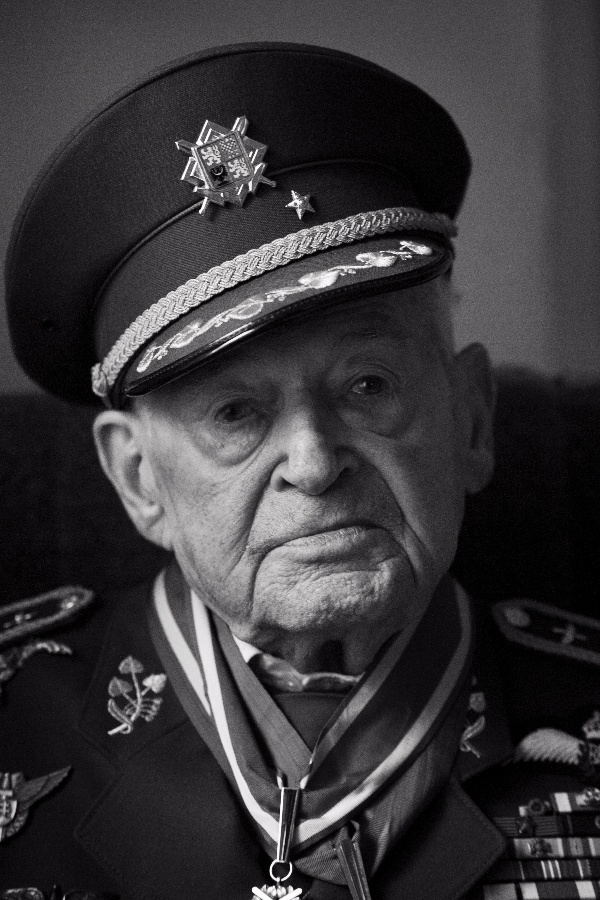Imrich GABLECH (*1915 - †2016)
- Read the story (PDF, 0 kB)

All that remained of the plane were metal tubes. Otherwise it was totally burnt out
The aviator Imrich Gablech, who lived in Havlíčkův Brod, was among those who joined the fight against Hitler at the very start of the war. Just before it he had courageously flown his plane to Poland, taking part in military operations there.
He could never forget the invasion of Poland. And despite the fact the Polish Army virtually retreated he fought on in his plane. “They were pursuing me. My final salvation was the river Vistula. It was sunny, the surface was shiny and I stuck to the water, which was like a mirror. It was really hard for them to take aim at me,” he recalled.
However, he needed to land. The airfield was in flames so he attempted to do so in a crown of trees that from a distance resembled a meadow. “Then I spied a small clearing and tried to land in it.” His flight concluded with a somersault. That was all he remembered. When he came to, he was sitting against a pine. He recalled his childhood, when as young boys they had made campfires. He saw one such fire. It was his own plane. “All that remained of the plane were metal tubes. Otherwise it was totally burned out.”
Imrich Gablech was born on 4 November 1915 near Nové Mesto nad Váhom in Slovakia. His parents were farmers. However, they wanted their son to get an education and he attended a grammar school, where he received a grant. Though his parents had hopes he would become a priest, he signed up to be an aviator. Later he recalled how this hurt his parents. He graduated from flying school and later served as a field aviator in Slovakia. Following the breakup of Czechoslovakia and the occupation of the Czech lands his only thought was how to escape abroad and fight. He decided to leave the Slovak state. This occurred on 7 June 1939, when he flew from Slovakia to Poland.
He joined the Polish air force in Deblin. During a German air raid on Deblin he managed to get away, though he crashed while being pursued. He succeeded in finding a new aircraft, however, and flew off again. He headed for eastern Poland, where he met other airmen. However, that Polish territory had been occupied by Soviet troops under the Molotov-Ribbentrop Pact, of which Gablech couldn’t have been aware. On 18 September 1939 his group were surrounded and arrested. He experienced hunger and violent looting. He himself was charged with espionage.
At the very beginning a Soviet officer had ordered him to sign a statement of some sort. “In Russian! At midnight! I said I wouldn’t sign, that I didn’t understand. So he pulled out a pistol and placed it at my temple. Sign! But I didn’t sign. The Soviet officer wondered in surprise that I wasn’t afraid. And put his pistol away.” This wasn’t the worst of it, however. “The worst thing was when I went blind in the Gulag. From hunger! I got better thanks to fish oil, which I ate and which helped. The Gulag really was the worst. But I kept believing. I’m a Christian and even in the worst moments I had my faith.”
The outbreak of conflict between Hitler and Stalin saved him. The former allies became enemies and the Soviet Union needed every prisoner. It also needed to cooperate with the British, who had hitherto fought alone. Gablech was released from the labour camp and reached the UK, where he joined a Czechoslovak unit. His aim was to fly again but he felt ill during a landing. He fainted. This was of course a result of his time in the Soviet labour camp.
“I fainted when I landed and a British officer called me to his office. I still hadn’t mastered English properly, so my communication was just so-so. He poured me a whiskey and asked what the problem was. I said I had returned from the Gulag. He was angry that I hadn’t said so immediately. I should have brought it up. But I defended myself. I said that we were a small state and I had escaped to fight. That I wanted to fight… I didn’t escape to hide somewhere… This was why I escaped.”
Gablech then served as a flight dispatcher until the end of the war. Following his return to liberated Czechoslovakia he was an air traffic controller, though he was released from the army a year after the Communist coup. He couldn’t find a job, going through several positions including as an accountant at a file workshop. In 1951 he was even briefly arrested. Like all the other brave airmen from the UK, he was a threat to the Communist regime.
In the end he lived to see the fall of communism and to receive honours. From Slovakia, the UK, Russia and Poland. He shared his recollections in talks at schools for as long as he was able.
Text by Luděk Navara